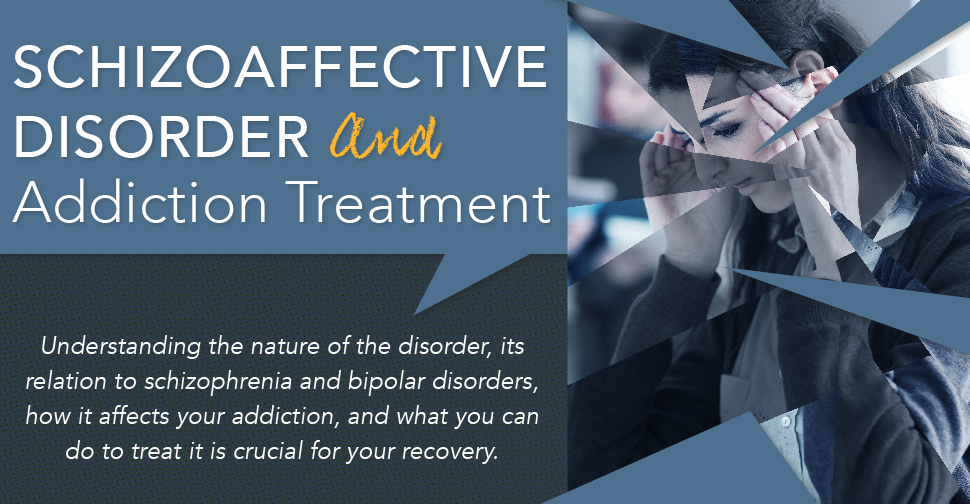
Mental health disorders can severely and negatively impact drug addiction and make it more difficult to obtain a new sober lifestyle. One of the most devastating of these problems is schizoaffective disorder. It creates an unstable lifestyle that often pushes people who suffer from it to drug and alcohol abuse and even addiction.
Understanding this disorder and the way it affects your addiction is crucial for your recovery. First of all, you need to understand the nature of the disorder, its relation to schizophrenia and bipolar disorders, how it affects your addiction, and what you can do to treat it.
What Is Schizoaffective Disorder?
The National Alliance On Mental Illness defines schizoaffective disorder in the following manner:
“Schizoaffective disorder is a chronic mental health condition characterized primarily by symptoms of schizophrenia, such as hallucinations or delusions, and symptoms of a mood disorder, such as mania and depression.”
Though relatively rare (only about 0.3 percent of the population is affected), schizoaffective disorder is devastating. Sadly, it is so rare that it is often misdiagnosed, as it so closely mimics symptoms of schizophrenia and bipolar disorder. Unfortunately, this means you may only receive partial or incorrect treatment, further distracting from your recovery.
The symptoms of schizoaffective disorder are problematic and cause a variety of erratic and unpredictable behaviors. Symptoms of this disease include the following:
- Fixed beliefs that contradict reality (delusions)
- Quick racing thoughts that are hard to control and which cause disorganized thinking
- Fluctuations between depression (feelings of sadness, emptiness, and worthlessness) and mania (euphoria, quick thinking, and impulsive behaviors)
- Hallucinations of visual or aural input
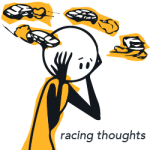
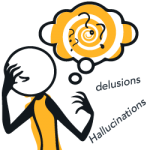
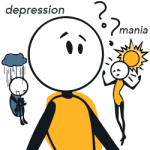
The causes of this disease are mysterious, especially as it is a relatively new and unstudied disorder. It does seem to run in families and is influenced by specific brain chemistry, though the precise nature of this relation is still unknown. However, people can actually develop schizoaffective disorder due to stressful situations or through the use of psychoactive drugs, such as cocaine, LSD, codeine, and mescaline.
Unfortunately, this quick onset can cause a variety of problematic behaviors that make a person’s tendencies toward such behaviors hard to control and which may lead to heavy drug use and abuse.
Is Schizoaffective Disorder The Same As Schizophrenia?
Although schizophrenia and schizoaffective disorder share many of the same symptoms, (such as hallucinations and delusions) they are not the same. Dr. Frederick J. Frese III—a mental health expert and writer for PBS—breaks down the difference by focusing heavily on the mood element of the disorder. Schizophrenia lacks the bipolar-like mood swings of schizoaffective disorder.
Elaborating on this point, Frese states that schizoaffective disorder is diagnosed when a person experiences schizophrenic symptoms while also suffering from bipolar symptoms. They must also show schizophrenic symptoms without bipolar symptoms and they must be present for at least a month.
Schizophrenia also requires a longer diagnosis period of at least six months of symptoms. These differences are crucial to understand and many experts believe that schizoaffective disorder is actually more closely related to bipolar disorder, rather than schizophrenia. Hence, the focus on the mood aspects of the disorder.
What Kinds Of Treatments Are Available For Schizoaffective Disorder?
The complex nature schizoaffective disorder treatment mirrors the nature of the disease. It affects such a wide range of your physical and mental health that it takes a concentrated and holistic effort to recover. However, with the right medical, psychological, and behavioral treatments, you can beat it.
Typically, schizoaffective disorder is treated medically by the antipsychotic drug paliperidone, otherwise known as Invega. This is currently the only medicine that is FDA approved to treat this disorder. However, doctors often utilize other antipsychotics, antidepressants, and mood stabilizers to treat some of the major symptoms of schizoaffective disorder.
Psychological treatment focuses on helping a person understand their disorder and the ways in which it affects their lives. Strategies such as peer support, group therapy, individual psychotherapy, and family counseling are implemented to help stabilize a person’s mind and give them the psychological distance they need to become more capable of handling their problems.
Behavior-adjustment therapies are designed to help change negative thinking and behavior patterns caused by schizoaffective disorder. Cognitive behavioral therapy is the most common of these methods. It creates coping tools you can use to manage the racing thoughts and behaviors of schizoaffective disorder.
For example, a behavior specialist may teach you to relax your mania with yoga or writing your thoughts down as they come. They may also teach you how to fight off relapse urges by focusing on healthier outlets, such as jogging or painting.
A new trend of ECT treatments has also been popping up lately. ECT is used to manage depression by sending electric impulses to the brain that help calm symptom severity. In cases where medication, psychology, and behavioral treatments don’t work, ECT is sometimes used as a last resort.
How Does Schizoafffective Disorder Influence Addiction?
The National Institute On Alcohol Abuse And Alcoholism reports that 9.7 percent of all people with schizoaffective disorder experience alcohol or drug abuse in their lifetime, while a further 24 percent experience true addiction. While these numbers are low compared to other mood disorders, they are severe enough to warrant further discussion.
Why do people with schizoaffective disorder suffer from such a high rate of addiction? The answer is complex. People with this disorder often use drugs or alcohol to self-medicate. After all, many drugs cause dulled senses and mental calm that are desirable for people with schizoaffective disorder.
Furthermore, the mania that occurs throughout the lifetime of this disease generates impulsiveness that causes a person to try a dangerous substance. Extended periods of mania then lead to continuing use of the substance, to the point where an addiction eventually develops and spirals out of control.
The schizophrenic symptoms of schizoaffective disorder may also compel a person to use drugs. The hallucinations and delusions that come with this disorder may make drugs an appealing choice, as a person may feel that drugs are either harmless or a powerful way of changing their consciousness.
Unfortunately, drug abuse and addiction only exacerbates the symptoms of schizoaffective disorder. They can create an even wider disparity in the mania and depressive episodes and cause increased hallucination and delusions. This is known as co-occurring disorders, as addiction is present with mental health disorders and it can create a tight grip that is hard to escape.
Does Dual Diagnosis Help With Schizoaffective Disorder And Drug Addiction?
Thankfully, escape from the clutches of schizoaffective disorder and drug addiction is possible with dual diagnosis. If you have never heard of it, dual diagnosis is the process of treating addiction and mental health disorders at the same time.
The knot of schizoaffective disorder and addiction is particularly tight, as both disorders feed each other so well. However, dual diagnosis has been found to be an effective way to decrease the severity of these symptoms in a safe and healthy manner. A typical dual diagnosis treatment includes:
- Physical detox to manage withdrawal symptoms
- Management of health problems caused by addiction
- Dietary adjustments to avoid undernourishment
- Psychologically probing the source of your addiction
- Working through your psychological problems in an individual or a group setting
- Attending behavioral adjustment classes that teach you coping mechanisms
- Continually working through the process to bring new hope to a person’s life
- Aftercare techniques that are designed to help get you back on your feet after leaving rehab
- Outpatient classes in relapse avoidance or regular meetings to help assess psychological and behavioral progress
This treatment method may seem exhaustive, but it is designed to holistically treat your addiction on all levels. Spiritual aspects, such as attendance in 12-Step programs, are also available, should you or your treatment specialists deem them necessary.
Can Schizoaffective Disorder Be Managed For Life?
Living with schizoaffective disorder is not easy, especially if it has pushed you into drug use. However, it is possible to manage your symptoms before and after addiction treatment and emerge as a newly clean, healthy, happy, and stable person. It requires lifelong diligence and a dedication to treating and understanding schizoaffective disorder and your addiction.
For example, you’re going to need to regularly take the medications that manage schizoaffective disorder severity and continue following the new behaviors you’ve learned during your recovery process. Staying on your medications gives you the balance to fight off cravings, while new coping behaviors fight the severity of both problems.
Let’s say that you feel yourself about to enter a manic episode and are worried that you’ll be compelled to use drugs. Immediately reach out to a support group when you feel your mania building. They can help you find an outlet for your overactive mind and excessive energy. You should also make sure to sleep, even if this requires sleep medication.
The major challenge here is learning how to track your triggers for both drug relapse and your schizoaffective episodes. With the help of behavioral therapists and psychologists, you can identify these situations and learn how to avoid them or decrease the severity of their impact on your life.
You Can Earn The Life You Desire
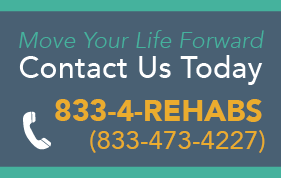 The two-pronged assault of schizoaffective disorder and drug addiction is a heavy burden, but it is one that you can beat. Thousands of people across the country have taken the plunge into recovery and emerged as healthy and drug-free people. So can you, as long as you’re willing to accept help.
The two-pronged assault of schizoaffective disorder and drug addiction is a heavy burden, but it is one that you can beat. Thousands of people across the country have taken the plunge into recovery and emerged as healthy and drug-free people. So can you, as long as you’re willing to accept help.
That’s where we come in. At DrugRehab.org, we have a core of expert addiction specialists who can move you through the difficulties of recovery. Contact us today to learn more about how we will get your sober and back on your feet.
